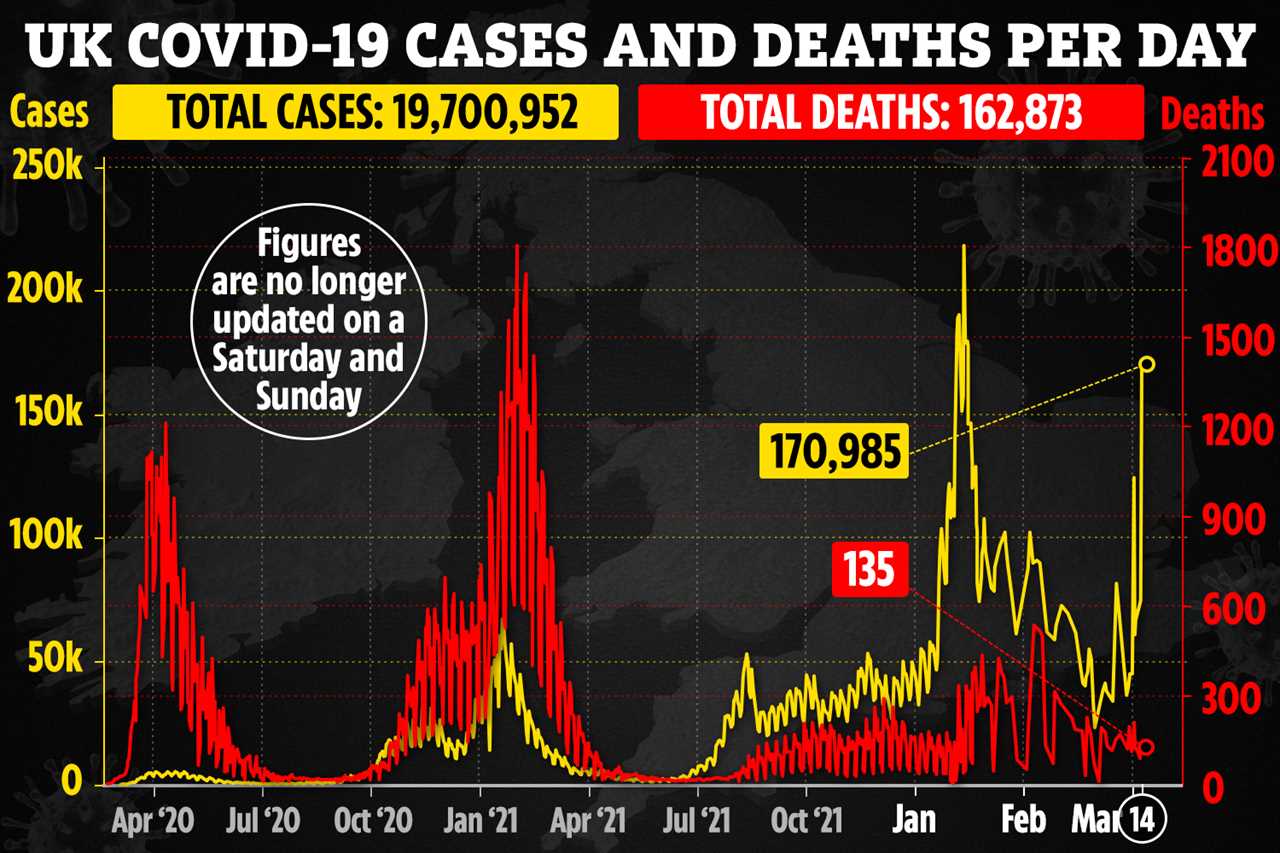COVID infections have hit 170,985 over the last three days as patients admitted to English hospital reaches 10,000, data has revealed.
It means that on average, close to 60,000 people a day are now testing positive for the bug.


Infection and death data provided by the UK Health Security Agency (UKHSA) does not include an update from Scotland, but includes cases and deaths from over the weekend.
Sadly a further 135 people have lost their lives 28 days after having a positive coronavirus result.
This equates to around 45 deaths each day.
NHS data shows that the number of patients needing hospital care has increased by 18 per cent in the last week.
As of today there are 10,576 people receiving care in hospitals up and down England.
Daily admissions hit 1,368 on Saturday, a slight decrease on previous days.
The South East has the highest hospital admissions, and in south west England, numbers are now their highest for nearly a year, with 1,081 patients as of March 14 – more than at any point since 1,109 patients were recorded on February 12 2021.
Data from NHS Digital also shows that more people are reaching out for help with the bug.
In the week up to March 13, 17,022 people were assessed by NHS 111 for Covid-19 symptoms – an increase of 3,608 on the previous week.
Despite the rise in cases and more people needing hospital treatment, the Health Secretary Sajid Javid said it’s not a ’cause for concern’.
He explained that this was to be expected after ripping up the Covid rulebook last month.
He told Sky News: “We keep the situation very carefully under review.
“There’s no other variant of concern out there that is an issue at this point in time.
“We have seen some rises in infections over the last week but given the increase in social mixing this was to be expected.
“And whilst the rate has gone up modestly in the last few days, that’s to be expected as we are now open as a country and there’s more social mixing, but there’s nothing in the data at this point in time that gives us any cause for concern.”
Brits who have tested positive for the bug have been logging cases on the ZOE Covid Study App, with estimates at 221,162 new daily infections.
The lead scientist behind it, Professor Tim Spector, said: “New Covid-19 cases in UK hit record high.
“221,000 cases per day and still rising – Scotland the worst hit but affects every region.”
The figure is much higher than the Government’s latest official numbers – the latest of which was 72,898 on Friday.
However the official UK Covid cases have also been rising, increasing since last Tuesday.
The latest estimate from the Office for National Statistics shows around one in 25 people are now infected with Covid.
The ONS says it’s not clear exactly what is behind the rise, but it is likely it is a combination of no restrictions, waning immunity and a more contagious sub-variant of Omicron becoming dominant.
BA.2 spreads faster than its sibling strain, although it is thought to be just as mild for most people.
The emergence of the “Deltacron” variant – a hybrid of Omicron and Delta – has also left a number of countries monitoring it closely.
But at the moments numbers are low and it is not clear if it poses any greater danger.
Mr Javid said that a “handful” of cases had been identified in the UK, but were “not of particular concern”.
It comes as immunity starts to wane in older Brits, and hospital admissions creep up.
New daily infections in the UK have also increased in the last few days, moving from around 40K-a-day last week to over 70,000 fresh cases yesterday.
Mr Javid last month urged Brits to get their boosters and make sure they have taken up all offers of jabs they are eligible for.
Data from the UK Health Security Agency (UKHSA) revealed if you have your booster, you’re 85 per cent less likely to end up in hospital than if you’re unvaccinated.
Omicron is milder – especially in the vaccinated – and Brits are now learning to live with Covid.
But as case numbers are still high with thousands catching the bug every day, jabs are the best way to protect yourself and others.
Lateral flow tests are still available online and in pharmacies for free, and while isolation is no longer legally enforced, if you have Covid it’s recommended you stay at home for at least five days.
Due to waning immunity in older groups, Brits over 75 years old, care home residents and people over 12 who are immunosuppressed can get a booster in a few weeks.
NHS England is prepped to start dishing out “spring doses” to eligible people later this month, as long as they are six months on from their last shot.
The original plan was to start the next phase of the rollout from April, but anyone who is eligible before then can have another vaccine.
It has not been confirmed when exactly this might start, with some reports suggesting from March 21 – if you think you are eligible, wait for your invite.
An NHS spokesperson said: “The NHS continues to follow JCVI guidance accepted by Government, and in line with this, the NHS will be vaccinating eligible people with a spring dose six months after their first booster starting later this month for the small number of people eligible before April.”
Extending the spring rollout to people under 75 or in other at-risk groups will be kept under review, the Health Secretary said last month.






